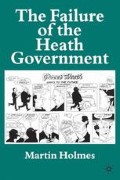Abstract
Like Mr Wilson’s freeze in 1966, Mr Heath’s Stage I standstill served as a breathing space when the more detailed operation of a full incomes policy could be worked out. Partly because freezes apply to everyone and last a comparatively short period of time they are more generally regarded with hostile compliance rather than with total rejection.
‘The first major British laws to control wages were the fourteenth century Statutes of Labourers, which vainly tried to curb the rise in wages after the Black Death of 1348. The attempt at comprehensive price control a thousand years earlier by the Roman Emperor Diocletian has now become almost an historical cliche.’
S. Brittan and P. Lilley The Delusion of Incomes Policy Temple Smith, 1977
Access this chapter
Tax calculation will be finalised at checkout
Purchases are for personal use only
Preview
Unable to display preview. Download preview PDF.
References
The Times, 8 December 1972.
Some Conservatives would argue that the sense of disillusionment was not to disappear until the election of Mrs Margaret Thatcher as Leader in 1975.
The swing to Labour at Bromsgrove was a staggering 10.1%. At the same time Labour held Southampton, Itchen with a 2.8% swing and Goole with an 8.7% swing.
D. HURD, An End to Promises: Sketch of a Government 1970–74, Collins, 1979, p. 109.
It should be noted, however, that as I. CREWE et al. have pointed out in ‘Partisan Dealignment in Britain 1964–74’, British Journal of Political Science, Vol. 7, 1977, pp. 129–90, the electorate was considerably more volatile in the 1970s than it had been at the time of Torrington in 1958, and Orpington in 1962. Thus any government faced more acute by-election losses than had previously been the case.
D. HURD, op. cit. (Ref. 4), p. 109.
Interview, Conservative MP.
Interview, Junior Minister
D. HURD, op. cit. (Ref. 4), p. 134.
Interview, Conservative Party Official.
W. KEEGAN and R. PENNANT-REA, Who Runs the Economy? Control and Influence in British Economic Policy, Temple Smith, 1977, p. 181.
Public opinion, however, supported the Government; 41% thought the counter inflation policy to be good for the country and only 24% thought it to be bad, Gallup International Public Opinion Polls (GB) 1937–75, p. 1223.
Cmnd. 5187, Select Committee on Expenditure, HMSO, 1973.
The Times, 20 December 1972.
The Times, 6 January 1973.
The Times, 11 January 1973. Mr Johnson’s article was written, of course, before his widely publicized change of political allegiance.
Cmnd. 5205. Programme for Controlling Inflation, HMSO, 1973. Stage II of the policy was due to begin in the Autumn.
The Times, 18 January 1973.
The Times, 20 January 1973.
The Times, 22 January 1973.
The Times, 2 February 1973.
R. BACON and W. ELTIS, Britain’s Economic Problems: Too Few Producers, Macmillan, 1976, p. 22.
The ‘N minus 1’ policy is often erroneously cited as a policy of ‘confrontation’ when compared with the Heath Government’s incomes policy.
The Times, 15 February 1973.
The Times, 16 February 1973.
The Times, 24 February 1973.
Hansard, 6 March 1973, Vol. 852, Col. 235.
It is worth noting that the Conservative Party had had a series of internal debates between the ‘growthmen’ and the ‘deflationists’, particularly following the resignation of Chancellor Thorneycroft in 1958 over what he considered to be excessive government spending.
S. BRITTAN, The Economic Consequences of Democracy, Temple Smith, 1977, p. 59.
The Times, 8 March 1973.
The Times, 15 March 1973.
The Economist, 31 March 1973.
Hansard, 22 May 1973, Vol. 857, Col. 218.
Interview, Treasury Adviser.
S. BRITTAN, op. cit. (Ref. 29), p. 61.
According to one Treasury Minister, ‘there was no dash for growth and no 5% target. We wanted to increase the level of demand above the growth of productive capacity and then to bring it in line with the growth of productive capacity’. Interview, Treasury Minister.
ALAN BUDD, The Politics of Economic Planning, Fontana, 1978, p. 122.
The Times, 18 May 1973.
Hansard, 12 May 1973, Vol. 855, Col. 1388.
Hansard, 28 June 1973, Vol. 858, Col. 1723.
Interview, Cabinet Minister.
The Times, 2 May 1973.
R. BACON and W. ELTIS, op. cit. (Ref. 22), p. 59.
Hansard, 7 May 1973, Vol. 856, Cols. 60–63.
The Times, 22 May 1973.
Hansard, 5 July 1973, Vol. 859, Col. 711.
Hansard, 18 July 1973, Vol. 860, Col. 1199.
The ‘Heath boom’ would have been a more accurate and appropriate description, given the rationality of the ‘Heath dilemma’ approach.
LORD ROBBINS, Political Economy Past and Present, Macmillan, 1976, p. 96.
The Times, 9 November 1973.
Author information
Authors and Affiliations
Copyright information
© 1997 Martin Holmes
About this chapter
Cite this chapter
Holmes, M. (1997). The operation of Stages I and II. In: The Failure of the Heath Government. Palgrave Macmillan, London. https://doi.org/10.1057/9780230376113_6
Download citation
DOI: https://doi.org/10.1057/9780230376113_6
Publisher Name: Palgrave Macmillan, London
Print ISBN: 978-0-333-71607-6
Online ISBN: 978-0-230-37611-3
eBook Packages: Palgrave Political & Intern. Studies CollectionPolitical Science and International Studies (R0)

